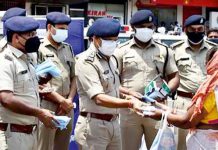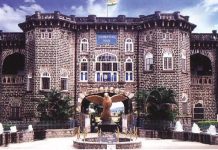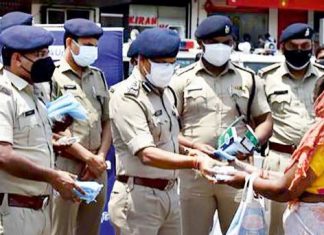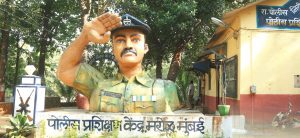 Marol Police Camp, a pioneering training institution of its kind functioning since the past 42 years has been known for producing most efficient and tough officers with active and creative minds. They have a good understanding of their role and responsibility towards the police force and society at large besides courage to act on the right path.
Marol Police Camp, a pioneering training institution of its kind functioning since the past 42 years has been known for producing most efficient and tough officers with active and creative minds. They have a good understanding of their role and responsibility towards the police force and society at large besides courage to act on the right path.
Maharashtra Police is the largest police unit in the country with a cadre of 282 Superintendents of Police, 523 Deputy Superintendents, 3522 Inspectors, 3123 Assistant Police Inspectors, 6230 Sub Inspectors and 1,80,550 men (members of constabulary).
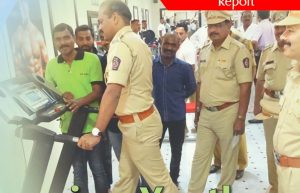 In 2017, the Maharashtra Police Academy completed 110 years. The institution has gained the reputation of producing tough and efficient officers since its inception in 1906. The academy (M.P.A) has been training Deputy Superintendent and Sub Inspectors of Police of Maharashtra. Before the establishment of the Central Police Training College (now N.P.A.) at Mt.Abu in Sept. 1948, the officers of the Indian Police were picked from Bombay Province which included areas of Gujarat, Sind –now in Pakistan and parts of present day Karnataka. They were also trained on joining the service
In 2017, the Maharashtra Police Academy completed 110 years. The institution has gained the reputation of producing tough and efficient officers since its inception in 1906. The academy (M.P.A) has been training Deputy Superintendent and Sub Inspectors of Police of Maharashtra. Before the establishment of the Central Police Training College (now N.P.A.) at Mt.Abu in Sept. 1948, the officers of the Indian Police were picked from Bombay Province which included areas of Gujarat, Sind –now in Pakistan and parts of present day Karnataka. They were also trained on joining the service 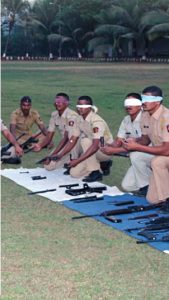 at P.T.S. at Nashik. Since Gujarat was a part of the erstwhile Bombay State till creation of separate State of Gujarat and Maharashtra in 1961, many senior officers of that cadre too were trained in this M.P.A. Officers of Goa, Pondicherry and Dadra & Nagar Haveli have also been trained from time to time at this institution. And the constabulary force of 1,80,550 men are trained at Police Training School. There are 9 police training schools in Maharashtra were unarmed police constables are trained are follows-Police Training Centres for Constabulary forces Police Training Schools are based at Nagpur, Solapur, Akola, Jalna, Latur, Nanveej- Daund, Khandala and last but not the least Marol. In this edition of Mumbai Protector, we have briefly covered Marol Police Camp established in 1975. Since then, the institution has trained more than 43,000 constabulary force of Maharashtra. Earlier, the functioning training of this camp was under the control of Police Commissioner, Mumbai. From January 1982, the Maharashtra Home Department, through a Government Resolution approved the Training Center under TeX / 0397 / CR / 615 / Pol-3 / Ministry of Home Affairs, Mumbai-400032 Additional Director General of Police, Training and Special Squads, Maharashtra State, Mumbai.
at P.T.S. at Nashik. Since Gujarat was a part of the erstwhile Bombay State till creation of separate State of Gujarat and Maharashtra in 1961, many senior officers of that cadre too were trained in this M.P.A. Officers of Goa, Pondicherry and Dadra & Nagar Haveli have also been trained from time to time at this institution. And the constabulary force of 1,80,550 men are trained at Police Training School. There are 9 police training schools in Maharashtra were unarmed police constables are trained are follows-Police Training Centres for Constabulary forces Police Training Schools are based at Nagpur, Solapur, Akola, Jalna, Latur, Nanveej- Daund, Khandala and last but not the least Marol. In this edition of Mumbai Protector, we have briefly covered Marol Police Camp established in 1975. Since then, the institution has trained more than 43,000 constabulary force of Maharashtra. Earlier, the functioning training of this camp was under the control of Police Commissioner, Mumbai. From January 1982, the Maharashtra Home Department, through a Government Resolution approved the Training Center under TeX / 0397 / CR / 615 / Pol-3 / Ministry of Home Affairs, Mumbai-400032 Additional Director General of Police, Training and Special Squads, Maharashtra State, Mumbai.
In an interaction with Mr. Somnath Gharge, Principal PTC (Police Training Centre) Marol, he described the qualitative training on the physical and mental level for constables.
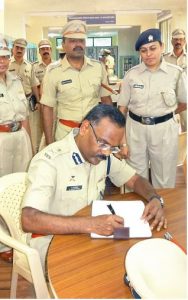
We recognize constabulary as the backbone of the police force and emphasize on physical, intellectual, emotional and social aspects. We are committed to provide Total Quality Education and Training to recruit police constables to meet the expectation of State Police Force and Society by upholding the rule of law and creating and maintaining quality of work culture in the organization.
Vision of Marol Police
We consider the Police Training Centre, Marol as one that provides the best training to new recruits to make them an integral part of the people friendly, responsive and professional workforce. Our mission is to train and develop new recruits who have active and creative minds to ensure that they imbibe a full understanding of their role and responsibility towards the police force and society. and develop into highly motivated personnel imbued with courage to act on the right path.
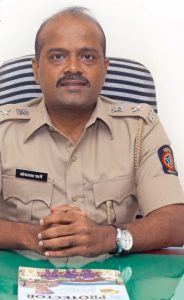 Facilities for Constabulary forces
Facilities for Constabulary forces
- Hostel: It has capacity of more than 250 rooms furnished with cots, beds, pillows, bed sheets, tables, chairs and cupboards, besides being equipped with solar hot water, electricity backup by wind mill, toilets, drinking water, water coolers, biogas plant and generator.
2. Facilities like library, gym, canteen, laundry, saloon, tailoring and hospital.
3. For entertainment we are providing LCD, carrom board, volley ball ground, newspaper and hall for cultural activities.
4. There is a computer lab fitted with 25 computers besides a motor driving simulator. We are providing modern arms and ammunition, medicine ball, logs, wooden horse and rope climbing facility for the trainees.
5. Modern well equipped mess – Dining tables, water coolers, purified water, fly killers, blowers and chimneys, grinders and mixers and essential utensils.
6. Law instructors,
7. Van for the students.
8. Modern AV classrooms equipped with laptops and multimedia projector.
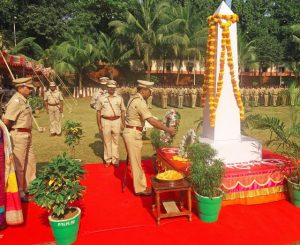 Levels of Training
Levels of Training
There are two levels of activities when we start training for constabulary force: Indoor and outdoor training
Indoor training
In indoor training also called as inter-section training, the trainees are educated in subjects like criminal laws, Science & Technology, Functioning of Police Department and Government, etc. The remaining five subjects are subjects related to the police department.
While providing training in inter- city at the Police Training Center, Marol, the Intermediate officers make maximum effort to make the most comprehensive information available to the trainees in a simple and understandable language. For this subject tutorials prepared by the Police Training Directorate are used. Instructions for audio-visual media, PowerPoint Presentation (PPT), Lesson Plan, PenDrive, Projector, Computer- Laptop, Newspaper Scene, Content Related Topics, Prominent and New or Revised High Court and Supreme Court – Case Studies, Candidates and Trainee Notes – Books, sample papers, topic guidelines, and other study material is used. And to use it, the material is provided to the trainee.
Outdoor Training
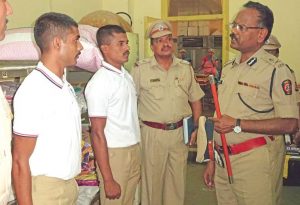 In Outdoor training, the officers are given Physical Training, Drill (Armory, weapon), Sticks drill, Weapon Training, Field Craft Tactics and Unarmed Combat, Demonstration Dodge, Reinforcement which includes (crowd control and mobs dispersal, yoga, guard mounting and county, adventure), Commando Training. The outdoor training starts early in morning at 6.30 am with Physical Training, running, and in between they are given 30 minutes break for breakfast and after that training goes on till afternoon. After lunch they attend coaching classes for science, technology and psychological studies.
In Outdoor training, the officers are given Physical Training, Drill (Armory, weapon), Sticks drill, Weapon Training, Field Craft Tactics and Unarmed Combat, Demonstration Dodge, Reinforcement which includes (crowd control and mobs dispersal, yoga, guard mounting and county, adventure), Commando Training. The outdoor training starts early in morning at 6.30 am with Physical Training, running, and in between they are given 30 minutes break for breakfast and after that training goes on till afternoon. After lunch they attend coaching classes for science, technology and psychological studies.
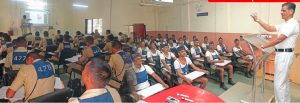 Emotional Intelligence Courses
Emotional Intelligence Courses
The Maharashtra police have become the first state in the country to introduce emotional intelligence as a subject in its syllabus in its police training schools and academy. With this move, the state aims to bring serious reforms in the police service delivery system and simultaneously improve professional efficiency. Impressed with the idea, the bureau of police research and development, which works under the Union home ministry, has already started mulling the idea of implementing the move across the country.
The Emotional Intelligence courses were started by our ADG (training and special units) S Jagannathan who decided to train the policemen in bid to improve their image in public. And with it, he (Jagannathan) took it to next level and roped in a private consultant for training police officers. The consultant studied the day-to-day roles of the policemen, their situations and conditions they work in and accordingly a syllabus was designed. In the first batch that was trained by the private consultant, 52 police officers across the state were trained for five days. Only 10 officers out of the 52 officers were selected as trainers.
From batch 2017, the Emotional Intelligence Courses was introduced in the syllabus of constabulary force, where he (Jagannathan) approached the Indian School of Business (ISB) and leading HR agency, Par Excellence, which conducts a capsule refresher (Emotional Intelligence Training Programme) EITP course for senior IPS officers at the Hyderabad academy. A support team was set up to help them conduct a statewide survey of police so they could understand the nuances of policing and devise a course accordingly. As part of our training, we analysed cases in which the police handled situations poorly. We found that those problems could have been avoided if we had acted more professionally. Mr Jagannathan has planned to expand the scope of this training to the state’s five police ranges, which have 60,000- plus men and officers, in the next six months.Importance of
Emotional Intelligence Training Pro- gram (EITP)
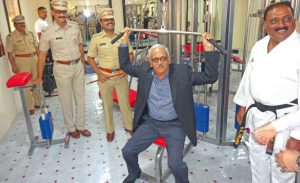 The training helps police officers realize their behavioral and psychological traits and those of the people they must deal with. It has been established in the corporate sector that a manager’s success is dependent on his intelligence quotient as well as his emotional quotient.
The training helps police officers realize their behavioral and psychological traits and those of the people they must deal with. It has been established in the corporate sector that a manager’s success is dependent on his intelligence quotient as well as his emotional quotient.
Emotional Intelligence is applicable to policing
It is equally, or even more applicable to policemen. An officer or constable is often approached by people in distress. They expect the police to treat them humanely and resolve their problems efficiently. In such situations, mere enforcement of law is not enough. It is also important to fulfil the complainant’s expectations. The officer should not only keep his emotions in check, he should also be able to understand the complainant’s mental state. Emotional stability translates into clarity of thoughts and overall performance.
Course Entail
The programme helps officers understand emotional intelligence. It comprises an assessment of their behavioral and psychological traits and an understanding of law. It also takes into account the psychology of complainants. So we approached professors from a private agency who train our forces about behavioral and psychological traits. Once they learnt the ropes, they were certified. They then conducted the programme at their respective institutes, for newcomers, and at mobile training programmes for veterans. The programme was introduced in schools and at the Nashik academy as part of the curriculum. It was included in the basic training syllabus for the constabulary. It takes one week, comprising 13 sessions, to train officers.
Cadets hone writing skills too
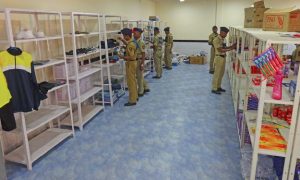 At the Marol Police Training Centre, police cadets are also in touch with daily affairs, voicing their opinions through articles in ‘Vichaar Manch’, a monthly writing competition. The competition was launched when a new library was inaugurated at the centre in September 2016, with the objective of encouraging reading and writing among cadets. “Teaching cadets about law and policing is easy.
At the Marol Police Training Centre, police cadets are also in touch with daily affairs, voicing their opinions through articles in ‘Vichaar Manch’, a monthly writing competition. The competition was launched when a new library was inaugurated at the centre in September 2016, with the objective of encouraging reading and writing among cadets. “Teaching cadets about law and policing is easy.
Vichaar Manch
‘Vichaar Manch’ is a platform for cadets to express their opinions on relevant issues and current affairs and also to gain knowledge and sensitivity in the process. The five best submissions, along with the writer’s name and chest number, are displayed on the notice board outside the library. Getting their name on the board becomes a matter of pride and inspiration for the cadets, say officials. In addition, 15 participants who put in a good effort also find their names on a list on the notice board. Winners also get a certificate acknowledging their achievement.
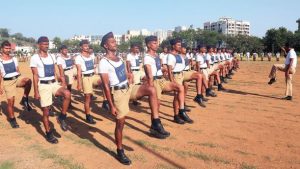 Articles ranging from positive and negative effects of demonetization to the challenge that Islamic State poses to India currently adorn the notice board. I was amazed to see that, this writing helped them to understand that they have good writing skills. We collect the articles and sent them to professors to choose the best. And after the selection of articles, we display them on the notice board, just to encourage them and to motivate them to continue it.
Articles ranging from positive and negative effects of demonetization to the challenge that Islamic State poses to India currently adorn the notice board. I was amazed to see that, this writing helped them to understand that they have good writing skills. We collect the articles and sent them to professors to choose the best. And after the selection of articles, we display them on the notice board, just to encourage them and to motivate them to continue it.
The new library has found more visitors as a result of the competition. More people want to write and to do that they first need to read. The older library, a150 sq ft room, with two tables, eight chairs and zero windows, understandably did not have many takers. “We now get over 40 students a day who come to read and expand their knowledge. The new library is spacious, is well- ventilated and lit and has over 5,000 books in Marathi, English and Hindi. Students can even request a book and we get it for them. After seeing their friends’ names on the notice board, cadets now come and say they want to write as well. More people now come and read books, periodicals and newspapers.
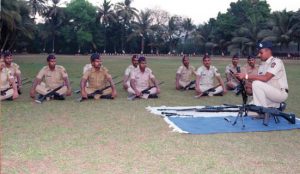 The library houses books from different genres, ranging from criminal law to crime fiction. We have complete collection of Sherlock Holmes, which is very insightful even though it is fiction. We also have Marathi versions of The Godfather and Agatha Christie novels. There are books on personality development, history, competitive exams. We even have Chicken Soup for the Soul. The library also has internet connection so that cadets can research any topic they want. Amol Subhash Dhamne, a 25-year-old cadet from Ahmednagar, is passionate about sports. He wanted to play kabaddi professionally but an injury came in his way. His article, which also made it to the notice board, was on India’s performance at Rio Olympics. He informed us “We won only two medals, but our women made us proud. After I read about the stories of Sakshi Malik, P V Sindhu and Dipa Karmakar, I wanted to write about them and their achievement” Amol said.
The library houses books from different genres, ranging from criminal law to crime fiction. We have complete collection of Sherlock Holmes, which is very insightful even though it is fiction. We also have Marathi versions of The Godfather and Agatha Christie novels. There are books on personality development, history, competitive exams. We even have Chicken Soup for the Soul. The library also has internet connection so that cadets can research any topic they want. Amol Subhash Dhamne, a 25-year-old cadet from Ahmednagar, is passionate about sports. He wanted to play kabaddi professionally but an injury came in his way. His article, which also made it to the notice board, was on India’s performance at Rio Olympics. He informed us “We won only two medals, but our women made us proud. After I read about the stories of Sakshi Malik, P V Sindhu and Dipa Karmakar, I wanted to write about them and their achievement” Amol said.
Somnath Gharge, said ‘The library came as a boost of confidence. Earlier they used to write but never revealed to anyone. Now after finding their articles on the board and they get encouraged to write. And all their batch mates can see their articles.’
Dummy Police Station
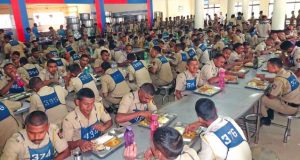 We have built a dummy police station at the police training camps all over Maharashtra. These police stations resemble our local police stations, which makes the trainees feel that they are in the field. Firstly, we tell them about FIR (First Information Report), Missing Report, NC (Non Cognizable Offence), and how to fill this form and when to fill it. And, then the most important part comes when they are talking to people. We trained them how to approach public and how to deal with the provocative situations. And during emotional intelligence course, we teach them that, firstly they need understand the complainants’ problem and always reply, never react. Many a time, we see that people are afraid to approach police if they are in some problem, because they have heard that, if they go to the police station to file complaint, then they will interrogate the complainant. The officers are also trained to investigate cases like murder, rape, theft, and accidents, etc. The training is given by senior officers who are still serving the country. These officers share their experience and also train them on gathering information and building sources and this help them when they are deployed in the field.
We have built a dummy police station at the police training camps all over Maharashtra. These police stations resemble our local police stations, which makes the trainees feel that they are in the field. Firstly, we tell them about FIR (First Information Report), Missing Report, NC (Non Cognizable Offence), and how to fill this form and when to fill it. And, then the most important part comes when they are talking to people. We trained them how to approach public and how to deal with the provocative situations. And during emotional intelligence course, we teach them that, firstly they need understand the complainants’ problem and always reply, never react. Many a time, we see that people are afraid to approach police if they are in some problem, because they have heard that, if they go to the police station to file complaint, then they will interrogate the complainant. The officers are also trained to investigate cases like murder, rape, theft, and accidents, etc. The training is given by senior officers who are still serving the country. These officers share their experience and also train them on gathering information and building sources and this help them when they are deployed in the field.
Cadet Mess
The Central Cadets’ Mess is one of the exclusive symbols of solidarity and brotherhood among cadets. The entire body of cadets breaking bread together is a heart warming sight and conveys the sense of belongingness, bonding and deep rooted attachment. It serves as a significant prologue to continued tri-service camaraderie and esprit-de-corps .The Mess can accommodate over 2100 cadets at a time. Its neat exterior is matched by its exquisitely designed interiors. The entrance is made of the mythological ‘Horn of Plenty’ artistically etched upon it. The inner walls are aesthetically decorated with mounted swords, pistols, flags, portraits and paintings. The central section of the hall has an excellent dance floor and lovely reliefs. The cadets come together to have breakfast, lunch and dinner which gives them a feeling of oneness and brotherhood.

